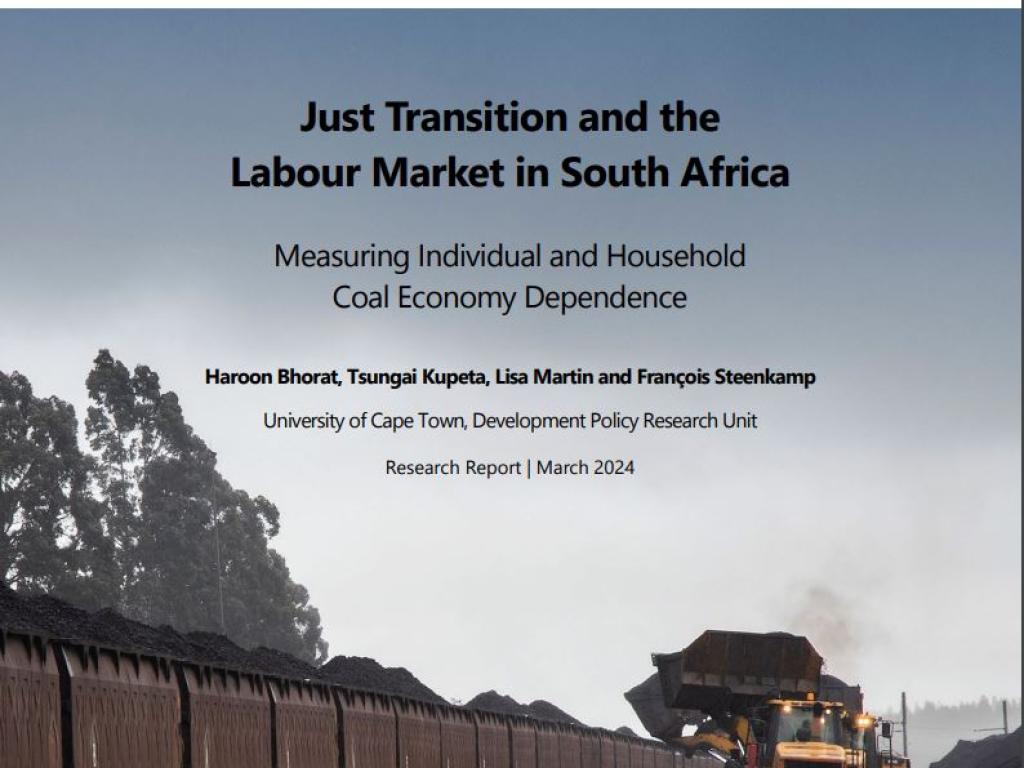Just published: Just Transition & the Labour Market in South Africa

Just Transition and the Labour Market in South Africa - Measuring Individual and Household Coal Economy Dependence, is authored by Prof. Haroon Bhorat, Lisa Martin and Dr François Steenkamp of the DPRU, with Tsungai Kupeta from UCT. This research, in collaboration with the Oxford Martin Programme on the Future of Development, contributes to the ongoing policy debate surrounding the just transition in South Africa, by carefully deriving a robust empirical estimate of the coal labour market in South Africa, and the related coal-based electrical utility industry in Mpumalanga.
Context:
South Africa finds itself at the early stages of transitioning away from fossil fuel-based economic production and processes, but this is a move not devoid of socio-economic costs, as coal has a direct and indirect economic footprint, and is a source of employment and livelihood for many South Africans. Despite this, delaying the transition could also prove costly, especially in light of evolving trade protocols that increasingly demand environmentally friendly alternatives. Understanding the labour market implications associated with a transition is pivotal in shaping policy decisions linked to the just transition. This research provides a robust quantitative estimate of jobs – both direct and indirect – associated with the coal sector in South Africa. We explore the labour market profile and characteristics of the individuals and households linked to the coal sector. The study uses industry and spatial dimensions to determine the scope of analysis, and focuses on measurable elements of the value chain, with particular focus on direct jobs linked to the coal mining industry. These initial empirical insights into the size and shape of the coal labour market can inform the scale and scope of these policy interventions.
Findings:
At first glance, the coal mining industry represents a relatively small proportion of the economy, regionally concentrated in both output and employment terms in Mpumalanga. However, the economic footprint is felt more acutely in its downstream linkages and also as a core export revenue generator. A natural (endogenous) transition is already underway given the lifespan of coal-fired power plants, working in conjunction with the ‘forced’ exogenous regulated transition to renewables. In a decade and a half, 50% of coal-fired power capacity will be retired. Our contribution here is to very carefully derive a robust empirical estimate of the coal labour market in South Africa – together with a measure of coal household dependency. An upper-bound national estimate of the jobs in coal suggest about 75 000 jobs in the industry, with 80% of these in Mpumalanga. In turn though, the majority are semi-skilled jobs, employing predominantly young African males with Matric+ educational levels. In moving to an early labour market assessment of the size and shape of the just transition, it is clear that the most extreme challenge lies with about 5000 workers in elementary occupations – possibly a core target for income support? In addition, the rump of the coal workforce – some 50 000 workers in semi-skilled positions – require a much more complex creative set of solutions to derive a medium-term policy response ensuring continued employment and income support to these workers and their households.
Acknowledgments:
The paper is published by the Oxford Martin Programme on the Future of Development and is available here: https://www.oxfordmartin.ox.ac.uk/downloads/reports/Just-Transition-and-the-Labout-Market-in-South-Africa.pdf
